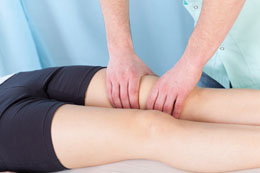Sharp and unbearable pain in legs can result in sleepless nights. Scroll down to know what are the conditions that can lead to severe leg pain and why the pain should never be neglected.

Leg pain is commonly observed after an injury, or after a long day of stressful work. It may involve intense pain in the bone tissue. Bone pain and weakened leg muscles are mainly considered as vitamin D3 deficiency symptoms. There are innumerable causes of leg pain, and most of the causes require prompt medical attention.
Causes
There are several diseases and disorders which can lead to deep severe pain in legs. Femur (thigh bone), tibia, fibula of the shin are the large bones in the legs. The feet and toes consist of smaller bones. Calcium or vitamin D deficiency can result in weak bones. Nighttime leg cramps or pain is quite common.
- Injuries, bone fractures, or even a hairline crack in a bone can result in aching leg.
- Osteomyelitis (infected bone) may exhibit symptoms like swelling, pain, redness at the spot of infection, and fever.
- Fatigue (excessive physical stress) is commonly experienced, but if you neglect it, it can lead to weak muscles and bones.
- Sickle cell anemia (disrupted blood supply) can be inherited, and it may result in severe pain.
- Osteoporosis (mineral deficiency, loss of bone density) is common in elderly women. Vitamin D can boost the process of calcium absorption by 30% to 80%. So, balanced diet can help prevent osteoporosis.
- Bone cancer, primary cancer that develops in bones can be the factors contributing to pain.
- Cancer spread into the bones (metastatic bone cancer which has its origin in some other part of the body) can also cause excruciating pain.
- Excessive consumption of certain medications like diuretics can result in loss of too much fluid or minerals, resulting in dehydration. This can cause leg cramps and pain.
- Overuse of statins is responsible for low cholesterol levels which may result in muscle injury.
- Tendonitis (inflammation of tendon) is one of the common causes of achy legs and feet.
- Osteoarthritis or gout leads to inflammation of the joint and severe joint pain (mostly in legs). This is a common cause of joint pain in elderly.
- Even benign tumors and cysts of the femur or tibia (osteoid osteoma) can cause severe pain.
- Hip bursitis (inflammation of the bursa in hips) can be the cause of aching legs.
- Several diseases or disorders like diabetes (especially uncontrolled diabetes), peripheral artery disease, anemia, multiple sclerosis, leukemia or other types of cancers can cause leg pain.
- Sedentary lifestyle and lack of exercise make bones and muscles weak. Healthy diet and regular leg exercises can help strengthen leg bones and muscles.
The pain can be experienced while resting, sleeping, or while working. People generally overlook the pain. As there exist several causes of pain, the treatment may vary from person to person. Prompt and proper medication helps control serious conditions like bone cancer or osteoporosis.
Constant leg pain can seriously affect the daily routine of a young athlete as well as that of an elderly man or woman. To function well, the body needs right amount of vitamins and minerals, in fact, the right amount of all the nutrients. If you experience severe pain in legs frequently, you should check whether you are following a healthy diet and lifestyle. Those who are worried because of achy legs should consult their physician immediately. Early detection of the cause and proper treatment help overcome most of the problems that are mentioned above.
Disclaimer: This Buzzle article is for informative purposes only, and should not be used as a replacement for expert medical advice.


 Leg pain is commonly observed after an injury, or after a long day of stressful work. It may involve intense pain in the bone tissue. Bone pain and weakened leg muscles are mainly considered as vitamin D3 deficiency symptoms. There are innumerable causes of leg pain, and most of the causes require prompt medical attention.
Leg pain is commonly observed after an injury, or after a long day of stressful work. It may involve intense pain in the bone tissue. Bone pain and weakened leg muscles are mainly considered as vitamin D3 deficiency symptoms. There are innumerable causes of leg pain, and most of the causes require prompt medical attention.